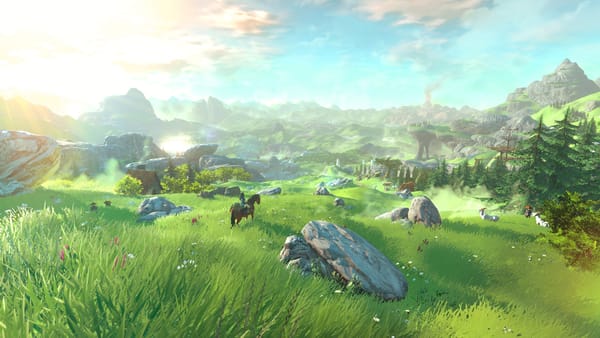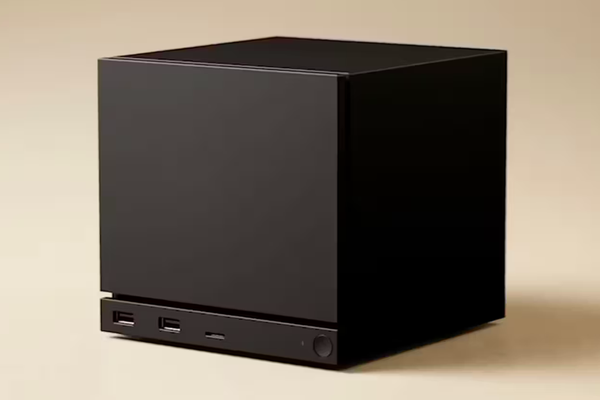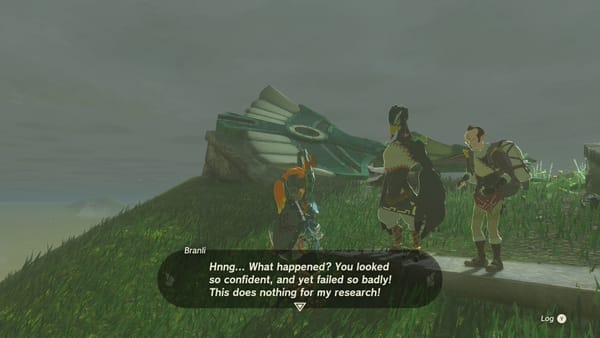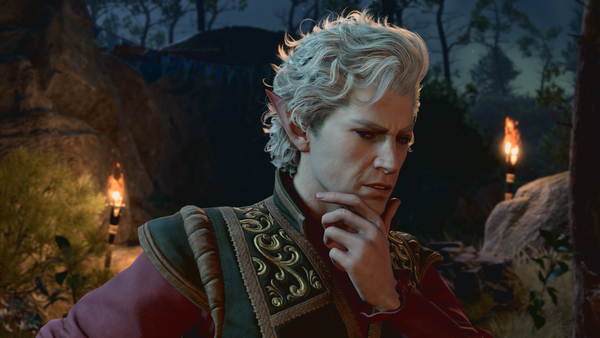#156: Pass notes
Five years on, we're still waiting for Game Pass to fulfil its most alluring promise. Time may be running out.
Here, before we get going: Hit Points passed 4,000 subscribers earlier this week, a shade over two months after hitting 3,000. I love you all — yes, even you. To celebrate you can now get a free seven-day trial of the full Hit Points experience: at least one additional edition per week, and occasional longform interviews with developer chums. To access the trial, visit any paywalled edition — perhaps Wednesday’s — and you’ll be presented with the offer.
Let me just say up front — because I have read enough Twitter replies and website comments over the years to know how this sort of thing usually goes — that I love Game Pass. It has saved me money on some big-name games I would otherwise have bought for fifty quid. It has allowed me to fall in love with certain titles that, at full price, I likely would have ignored, and drawn my attention to some fabulous things I’d never even heard of. It has satisfied my curiosity about plenty of games that I wasn’t sure were for me and, a speedy download and ten exploratory minutes of play later, I realised I was right about.
Plenty of developers and publishers love Game Pass too. They appreciate the way it helps de-risk the business of making games, guaranteeing a certain amount of revenue and offering a route to a sizeable, curious audience. Game Pass has become a form of organic marketing, the word-of-mouth buzz around some recent addition or other raising its profile and boosting sales on other platforms, sometimes even on Xbox itself. Is that all clear? Good.
With all that said, I’m starting to worry about Game Pass. I’m not sure it’s working out. I think it is taking too long to become the service it was originally designed to be, and that the longer the wait continues the less likely it is to actually happen. I am not currently minded to renew my subscription when it expires, and anecdotally I know a number of people have already let theirs lapse. Microsoft has had a huge window of opportunity to build an irresistible subscription service, free of serious competition or regulatory oversight. That window, I think, is closing. I think Microsoft knows it too.
The company is typically evasive about how Game Pass is performing, though details dribble out in interviews and fiscal results from time to time. We’ve had both of those this week, and combined with revelations that have emerged from regulatory investigations of the Activision deal, we have a slightly clearer picture of the state of things. It is, in places, a worrying sight.
The Brazilian antitrust regulator recently revealed (and then un-revealed, after realising it was sensitive information) that Game Pass brought in $2.9 billion in 2021. Speaking at WSJ Live earlier this week, Phil Spencer confirmed that, in its current form, Game Pass is profitable, and since we are nice we will take him at his word. He also said that the service brings in around 15% of Microsoft’s total gaming revenue, and “I don’t think it gets bigger than that. I think the overall revenue grows so [it’ll be] 15% of a bigger number, but we don’t have this future where I think 50 to 70% of our revenue comes from subscriptions.”
This seems to me to be quite a change of thinking. I find it hard to believe that, when the vision for Game Pass was being sketched out and Microsoft decided to spend billions of dollars disrupting its entire gaming operation by creating, and then cornering, an entirely new market sector — spending heavily on studio acquisitions and giving all their games away at launch — that 15% of overall divisional revenue was the limit of its ambition. I reckon that, if 15% was the number on the whiteboard in those early kickoff meetings, Game Pass would never have happened.
The dark portents do not stop there. In the same WSJ Live interview, Spencer admitted that growth of Game Pass on consoles has slowed down of late. “At some point,” he said, “you’ve reached everybody on console that wants to subscribe.” Really? Already? According to the most recent available data, there are 63m Xbox consoles in the wild, and 25m Game Pass subscribers. That suggests a takeup rate of less than 40% on console (it is likely even less, given that some of those 25m are on PC). This is as good as it gets, or ever will? You have to sell two-and-a-half consoles for every new Game Pass subscriber? This feels… not ideal, surely.
If Spencer truly believes this, then it is clearly a recent realisation. Microsoft ties its executive compensation to a series of performance-related targets, and the only gaming-related goal for the 12 months to June 2022 asked for Game Pass to grow by 73%. That does not, to me, reflect a company that believes Game Pass has plateaued on the primary device on which it is available. Perhaps it does now: it missed that target by a mile, with the service posting growth of just 28%.
Microsoft’s latest fiscal results, revealed earlier this week, were hardly a disaster for its gaming business. There was a new record for quarterly revenue; hardware sales were up 14%, suggesting the worst of the supply-chain crunch is over; more than 20m had played games over the cloud; and PC Game Pass subscriptions rose 159% year-on-year. But revenue from games and services fell by 3% — the second consecutive quarterly decline — despite the uptick in hardware sales, and the apparent surge in interest in Game Pass on PC. Microsoft ascribes that to a lack of firstparty and thirdparty content. Sure, it’s been a quiet few months. But this is hardly some external factor that is beyond Microsoft’s control. You make the games, guys! Well, you’re supposed to. And this, I reckon, is the nub of the issue.
Back in my Edge days I would come home from E3 and, more often than not, write a piece bemoaning the state of Xbox’s firstparty operation. It was Halo, Gears and Forza on rotation, with precious little in between. Microsoft’s acquisition spree was clearly designed to put that right. It began at E3 2018, when Spencer announced the purchase of four studios — Ninja Theory, Playground Games, Compulsion Games, and Undead Labs — and the formation of a new studio, The Initiative, in Santa Monica. In the four-and-a-half years since, only one of those studios has shipped a new game. It was Playground, and in fairness it has shipped two. Unfortunately they were both bloody Forzas.
None of the other studios brought on board since has managed to reverse the trend. Obsidian? The Outer Worlds (multiplatform, published by Private Division, already in development when the acquisition was announced) and Grounded (quite good apparently, but hardly a Game Pass killer app). Inxile? The already announced and crowdfunded (and multiplatform) Wasteland 3. Copy-paste that sentence for Double Fine and Psychonauts 2. Bethesda? Deathloop and Ghostwire Tokyo, both funded by and exclusive to PlayStation.
I get that game development is difficult, and takes a long time, and all that. Obviously none of these studios were going to start rolling out the Game Pass bangers overnight, and of course many had pre-existing contractual commitments to honour when they were bought out. But what of the existing members of the Xbox Studios crew? What have they given us? Halo Infinite? That was clearly not the work of a studio with a coherent plan, and I now wonder just how special a case 343 Industries is. It seems increasingly to be reflective of the environment in which it finds itself; a troubled studio for sure, but one surrounded by a dysfunctional family.
Yes, the pandemic hit game development hard. Its impact is being more keenly felt in 2022, as lockdown-era projects slip from their original release windows, than when Covid was at its peak. But surely things should not be this bad. Just five games will bear the Xbox Game Studios logo in 2022. One was developed externally by an indie studio; another has been in Game Preview for two years; another is a Forza expansion, and another a re-release. Obsidian’s Pentiment will be the only new game, developed entirely within Microsoft Studios, to land on Game Pass in 2022. I am well up for Pentiment, don’t get me wrong. But this is not how this subscription malarkey looked in the brochure.
The idea behind Game Pass is terrific. But a cornerstone of that idea is a suite of irresistible, bleeding-edge, exclusive firstparty content that, five years on, is still only a theory. Microsoft has assembled a huge, industry-leading stable of studios to support a paradigm-shifting content business and somehow found itself desperately starved for content, forcing it to keep writing cheques to thirdparties to keep the games coming. (It is very good at that, fair play.) No wonder Phil Spencer wants to buy Activision Blizzard: at least it can get a bloody game out the door. If Microsoft wants the regulators to wave the acquisition through, it could do a lot worse than simply showing them its firstparty release schedule since Game Pass launched. It makes quite a compelling case.
MORE!
- Frontier is ending support for F1 Manager 2022 just two months after launch, in order to focus its attention on F1 Manager 2023 and annual iterations thereafter. This rather blithely assumes they’ll be anyone left playing it by then; the game’s community is, quite understandably, furious at the news.
- Rocksteady co-founders Sefton Hill and Jamie Walker are heading for the exit door at year’s end. I have fond memories of my visit to Rocksteady for the Edge Arkham Knight cover a million years ago. It seemed a great place, but it’s obviously been a choppy few years over there. They’re both good eggs, and Hit Points wishes them all the best with whatever’s next.
- In a rather cruel refutation of all that stuff I wrote up top, RGG Studio’s Masayoshi Yokoyama has credited Game Pass with the surge in popularity the Yakuza series has seen in the west. I am fine with this, as it further bolsters my Yakuza-hipster credentials. Been playing since the start, mate. Imported the Japanese original, didn’t I. All you Kiwami arrivistes make me sick.
- Ben Brode’s Marvel Snap is going great guns, bringing in $2m in its first week. I’ve only dabbled but it seems quite smashing, I must say.
- Tributes have been paid to Rieko Kodama, the veteran Sega developer of such classics as Phantasy Star and Skies Of Arcadia. Kodama passed away in May but Sega opted not to announce it out of respect for her surviving family; word eventually got out after a tribute was spotted in the staff credits for the Mega Drive Mini 2.
- The Callisto Protocol will not be releasing in Japan, its violent content having fallen foul of beady-eyed ratings board CERO.
- A few weekend treats to close us out: I greatly enjoyed this Hideo Kojima interview by Hit Points chum Simon Parkin; the 100th episode of Hit Points’ favourite podcast The Back Page is absolutely inspired, a fake clips show that I am honestly in awe of; and I will be carving out some time this weekend for the latest episode of Game Maker’s Notebook, featuring SIE London Studio co-heads Tara Saunders and Hit Points pal Stuart Whyte.
There we go! Gosh, I’ve struggled this week, for reasons that aren’t entirely unclear. Probably lack of sleep, isn’t it. Most things are. Have yourselves a wonderful weekend, whatever you’re up to, and I’ll see you all next week. I’ll see paid subs first, of course: for the rest of you, here’s that button again.





